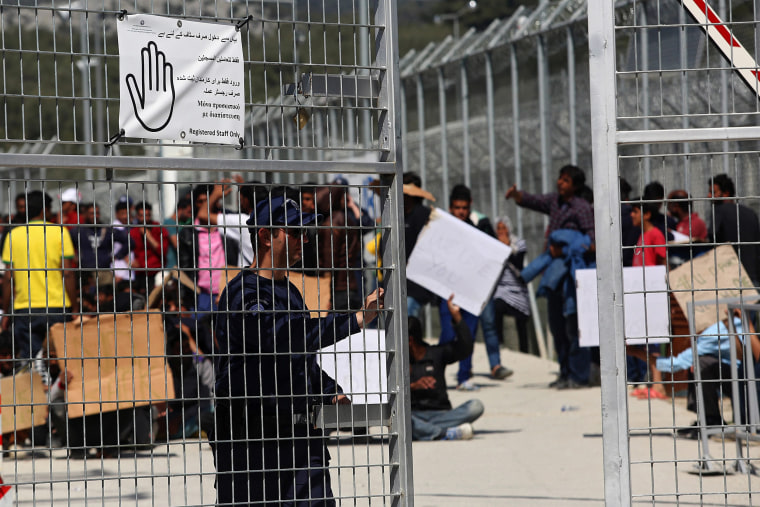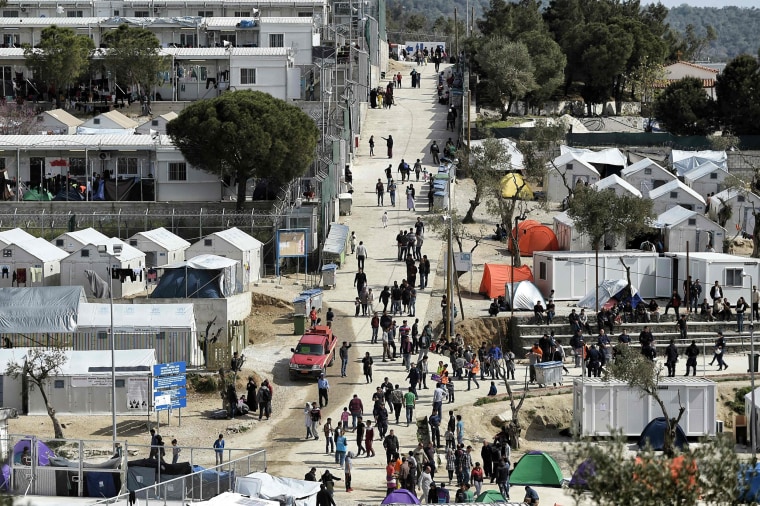LESBOS, Greece — Pope Francis arrived in the Greek island of Lesbos on Saturday where he is due to visit a detention center holding migrants — where inhabitants say they are living in horrendous conditions.
"It's not like a refugee camp, it's like a prison,” said Sayed Parwez from behind the razor wire and a chain-link fence at Moria camp on the Greek island of Lesbos.

“It's like Guantánamo — it's no different," the Afghan national told NBC News. "We are living right here like prisoners. Now under one tent we are living 20, 25 people. It is unbelievable, inhumane."
Parwez and more than 3,000 others are not free to leave Moria, which until last month was a camp for migrants — who were allowed to come and go at will. It was turned into a detention center for those slated for deportation as part of a deal the European Union struck with Turkey to return thousands of migrants.
Parwez called attempts to clean up the camp, whose walls have a fresh coat of paint, “a true lie."
"People here are fighting for their food like animals because the food is not enough,” according to Parwez, who said he had worked as an interpreter for the U.S. Army in Afghanistan and fled the country because the Taliban wanted to kill him.
Moria will be the pope's first stop. Francis is traveling with Ecumenical Patriarch Bartholomew I, the spiritual leader of Orthodox Christians, and Athens Archbishop Ieronymos, the head of the Church of Greece.
The religious leaders' visit to Lesbos, where more than half of migrants heading to Europe have landed first, comes amid criticism of the March 18 E.U.-Turkey deal. The plan stipulates that anyone arriving clandestinely on Greek islands on or after March 20 will be returned to Turkey unless they successfully apply for asylum in Greece.
Related: Migrants Deported From Greece, Land in Turkey Under EU Deal
In another tented camp by the sea, Ajmal Ahmad held out hope that the pontiff’s visit would make a difference.
“The pope will come to see us and we hope he will find a good solution for us. It is a hope raised in our hearts,” said Ahmad, who is originally from Pakistan.

An Iraqi doctor named Ahmed was in Kara Tepe, a camp run by the city of Mytilene and where several hundred people live in prefabricated huts with help from the United Nations’ refugee agency (UNHCR).
Ahmed, who didn't want to give his last name, said he had treated Iraqi soldiers and police officers in his hometown Mosul before fleeing last year after an ISIS gunman tried to kill him. He feared for his life and his family's life, Ahmed said.
Gallery: First Migrants Deported From Greece to Turkey
The pope "can remind the people, the governments, that we are human beings, we are from countries of war,” Ahmed said. “It will make a difference.”
Near him was Yassir, a Palestinian from the Yarmouk area of the Syrian capital Damascus where ISIS is still fighting. Yassir also did not want to give his second name because he said he feared for his life.
Yassir said left Syria with his pregnant wife said he was optimistic about the pontiff's visit.
Pope Francis can "show the world the misery of the refugees" and call for an end to the war in Syria, he said.
Yassir added: "Something good will happen, but European borders will not open and Turkey will not change because of the pope's visit.”
